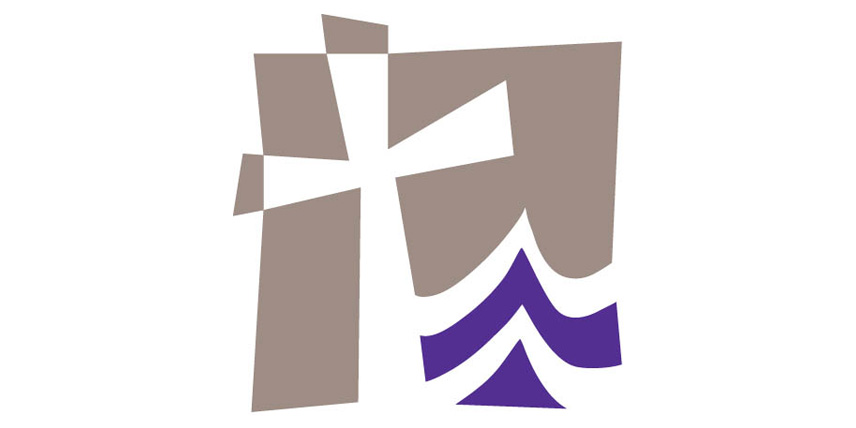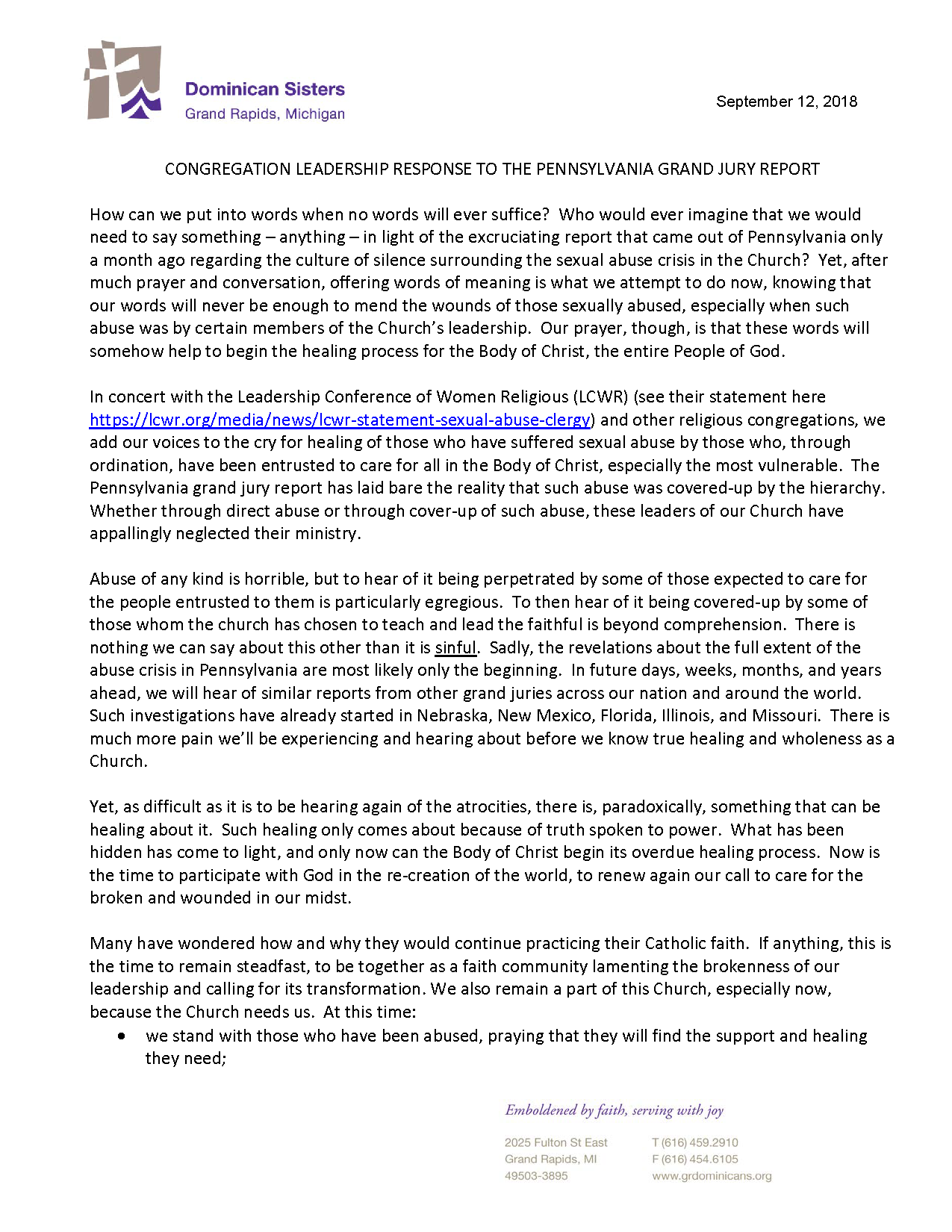
How can we put into words when no words will ever suffice? Who would ever imagine that we would need to say something – anything – in light of the excruciating report that came out of Pennsylvania only a month ago regarding the culture of silence surrounding the sexual abuse crisis in the Church? Yet, after much prayer and conversation, offering words of meaning is what we attempt to do now, knowing that our words will never be enough to mend the wounds of those sexually abused, especially when such abuse was by certain members of the Church’s leadership. Our prayer, though, is that these words will somehow help to begin the healing process for the Body of Christ, the entire People of God.
In concert with the Leadership Conference of Women Religious (LCWR) (see their statement here https://lcwr.org/media/news/lcwr-statement-sexual-abuse-clergy) and other religious congregations, we add our voices to the cry for healing of those who have suffered sexual abuse by those who, through ordination, have been entrusted to care for all in the Body of Christ, especially the most vulnerable. The Pennsylvania grand jury report has laid bare the reality that such abuse was covered-up by the hierarchy. Whether through direct abuse or through cover-up of such abuse, these leaders of our Church have appallingly neglected their ministry.
Abuse of any kind is horrible, but to hear of it being perpetrated by some of those expected to care for the people entrusted to them is particularly egregious. To then hear of it being covered-up by some of those whom the church has chosen to teach and lead the faithful is beyond comprehension. There is nothing we can say about this other than it is sinful. Sadly, the revelations about the full extent of the abuse crisis in Pennsylvania are most likely only the beginning. In future days, weeks, months, and years ahead, we will hear of similar reports from other grand juries across our nation and around the world. Such investigations have already started in Nebraska, New Mexico, Florida, Illinois, and Missouri. There is much more pain we’ll be experiencing and hearing about before we know true healing and wholeness as a Church.
Yet, as difficult as it is to be hearing again of the atrocities, there is, paradoxically, something that can be healing about it. Such healing only comes about because of truth spoken to power. What has been hidden has come to light, and only now can the Body of Christ begin its overdue healing process. Now is the time to participate with God in the re-creation of the world, to renew again our call to care for the broken and wounded in our midst.
Many have wondered how and why they would continue practicing their Catholic faith. If anything, this is the time to remain steadfast, to be together as a faith community lamenting the brokenness of our leadership and calling for its transformation. We also remain a part of this Church, especially now, because the Church needs us. At this time:
- we stand with those who have been abused, praying that they will find the support and healing they need;
- we stand with priests and bishops who have faithfully fulfilled their vocation to care for the Church, who now unfairly shoulder the weight of the accusations;
- we stand with one another, embarrassed by the actions of Church leadership and facing our own questions, yet believing in the Spirit of God and the grace of the sacraments to guide us and inspire us to respond; and
- we pray for those who have abused and/or covered up abuse, believing that despite their actions, they are still beloved children of God (as hard as that might be to imagine).
Finally, we come together as a Church remembering that we are not a part of this Body of Christ because of its human leadership but because of our faith in Jesus the Christ, the true head of the Body. It is he who has called us, and it is he who will heal us. This is not to say that we are not to take some active role in the healing. We are not passive members of the Church. We have been given the Spirit of Jesus in baptism and that Spirit works in us and through us. Our task is to work in concert with the Spirit, exercising the gifts bestowed upon us. It is time to claim that Spirit as our own and to do what we can, such as:
- believing those who share their experience(s) of abuse
- offering time and money to organizations that work for the end of abuse
- writing our bishops, letting them know of our dismay, and requesting that they work even harder to uncover the roots of the abuse crisis, dismantle the culture of secrecy, and begin the work of transformation of church leadership by calling on the laity.
As we write this, our Jewish brothers and sisters are celebrating Rosh HaShanah and Yom Kippur, their high holy days. Rosh HaShanah is the beginning of the New Year in the Jewish calendar. After two days of celebrating a new year, they enter into ten days of repentance at the end of which they celebrate Yom Kippur, a day of atonement, prayer, and fasting. In his response to the Pennsylvania report, Pope Francis has said, “The only way that we have to respond to this evil that has darkened so many lives is to experience it as a task regarding all of us as the People of God. This awareness of being part of a people and a shared history will enable us to acknowledge our past sins and mistakes with a penitential openness that can allow us to be renewed from within. Without the active participation of all the Church’s members, everything being done to uproot the culture of abuse in our communities will not be successful in generating the necessary dynamics for sound and realistic change.” We pray that through the atonement, prayer, fasting and active participation of all the Church calling and working for change, we will see a new day of the Lord.
Peace and blessings,
Sr. Sandra Delgado, OP, Prioress; Sr. Joan Williams, OP, Vicaress; Sr. Maureen Geary, OP, Councilor; Sr. Megan McElroy, OP, Councilor


